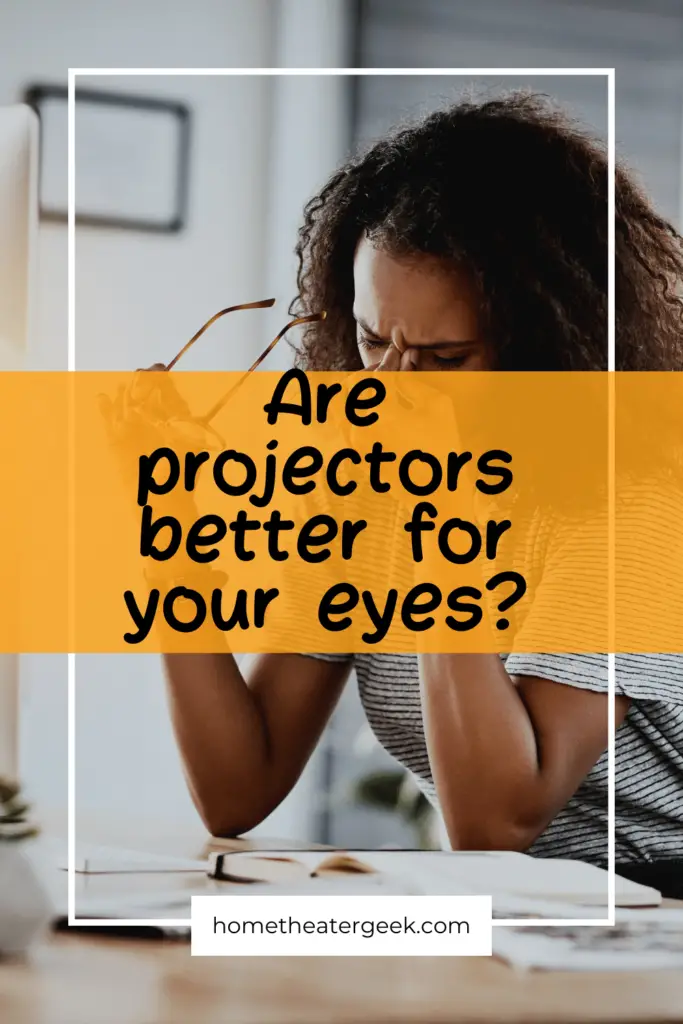Contrary to what you may think, these projectors are actually better for your eyes than traditional ones. Keep reading to find out why!

Table of Contents
Are projectors better for your eyes than traditional TVs?
Projectors have been around for a long time, but they only recently became popular for home use. Many people believe that projectors are better for your eyes than traditional TVs, but is this really true? There are a few things to consider when answering this question. First of all, projectors produce a brighter image than TVs, which can reduce eye strain.
Additionally, projectors allow you to adjust the size and position of the screen, so you can always find a comfortable viewing angle. Finally, projectors use LED bulbs, which emit less blue light than the LCD screens used in most TVs. Blue light has been linked to eye fatigue and even macular degeneration, so it’s important to minimize your exposure to it. Overall, projectors offer a number of benefits that make them better for your eyes than traditional TVs.
Benefits of using projectors
Projectors have come a long way since their inception and are now lighter, more portable and have better resolution than ever before. They are an increasingly popular choice for businesses, schools and universities who need to give presentations, as well as for home cinema setups. Here we will explore some of the key benefits of using projectors.
Projectors allow you to make the most of your space. A small projector can create a large image, meaning that you don’t need a lot of space in order to give a great presentation. You can also use a projector in a wide variety of lighting conditions, unlike a TV which needs to be in a dark room in order to be effective.
Projectors are also very cost-effective. The initial investment may be slightly higher than buying a TV, but you will save money in the long run as projectors use less energy than TVs. Projectors also have a longer lifespan than TVs, so you won’t need to replace them as often.
When it comes to giving presentations, projectors allow you to make a big impression. A well-chosen projector can make your presentation more engaging and professional-looking, helping you to win over clients and customers.
Overall, projectors offer a number of advantages over traditional TVs. They are more versatile, cost-effective and offer a better viewing experience. If you’re looking for a new way to watch movies or give presentations, then investing in a projector is definitely worth considering.
Can you minimize eye damage when using a projector?
When using a projector, it is important to take measures to minimize eye damage. The light from the projector can be intense, and staring at the screen for extended periods of time can lead to eye fatigue and strain. To reduce the risk of eye damage, it is recommended that you take breaks often and blink regularly while using the projector. You should also try to sit at least six feet away from the screen, as this will help to reduce the amount of light that enters your eyes. By following these simple tips, you can help to protect your eyes from damage when using a projector.
How to find the right projector that’s better for your eyes?
Projectors provide a large screen size and can be placed closer to the viewers than televisions, making them ideal for movies, presentations, and video gaming. However, some people find that looking at a projected image for an extended period of time can be screenful on the eyes.
If you’re concerned about eye fatigue, there are a few things to look for when choosing a projector. First, make sure that the projector has a high contrast ratio. This will ensure that the image is clear and easy to see. Second, look for a projector with a low blue light setting. This will help to reduce the amount of blue light exposure, which has been linked to eye fatigue.
Finally, consider choosing a projector with an automatic shut-off timer. This way, you won’t have to worry about forgetting to turn off the projector and causing unnecessary eye strain. By following these tips, you can find a projector that’s better for your eyes and helps to reduce eye fatigue.
Tips to use the projector with least eye damage
There is no denying that projectors can be extremely helpful, especially when it comes to presentations or movie night. However, there is also no denying that they can be damaging to your eyesight if you’re not careful. Here are a few tips to help you use a projector with minimal eye damage:
- Sit as far away from the projector as possible. The further away you are, the less strain your eyes will be under.
- Take breaks often. Even if you’re just looking at a screen for a few minutes, your eyes can start to feel strained. Every 20 minutes or so, take a few seconds to look away from the projector and allow your eyes to rest.
- Adjust the brightness and contrast settings. If everything on the screen is too bright or too dark, it can be hard on your eyes. Try fiddling with the settings until you find a balance that’s comfortable for you.
By following these tips, you can minimize the amount of eye damage caused by using a projector.
How long you can use a projector with no eye damage?
How long you can use a projector with no eye damage? The simple answer is that it depends on the individual. Some people may experience eye strain after using a projector for only a few minutes, while others may be able to use one for hours without any problems.
There are a number of factors that can affect how long someone can use a projector without experiencing eye strain, including the brightness of the projection and the distance between the user and the screen. In general, it is best to take breaks every 20 minutes or so to give your eyes a chance to rest. If you start to experience symptoms such as headaches or blurred vision, it is important to stop using the projector immediately and consult a doctor.
Conclusion
So, are projectors better for your eyes? In short, yes. Projectors emit a more consistent light than TVs, meaning that you’re less likely to experience eye fatigue or strain when watching content on a projector screen. Additionally, projectors typically have a higher contrast ratio than TVs, making blacker blacks and whiter whites appear more vivid and lifelike. If you’re in the market for a new television and want to make sure you’re choosing one that will be the best for your eyesight, consider opting for a projector instead.

